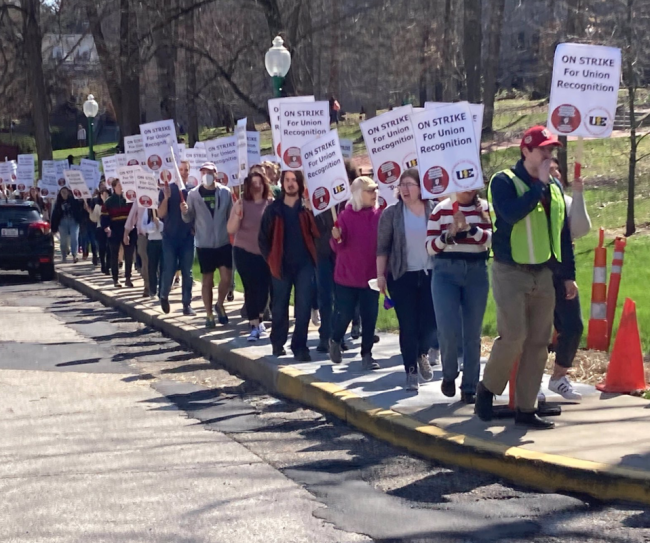You have /5 articles left.
Sign up for a free account or log in.

Part of the picket line on Indiana University at Bloomington’s campus this week.
Twitter/@IndianaGrads
Graduate assistants at Indiana University at Bloomington are on strike as they seek both union recognition and collective bargaining powers from their institution.
Strikers, who began their work stoppage Wednesday, are asking for better pay, to help bridge the gap between minimum stipends that were until recently under $18,000 and the current estimated cost of living for a single person in Bloomington (some $26,600, after taxes). They also want to see the elimination of student fees that cut into their stipends, to the tune of $1,350 per year for U.S. students and more for international students.
Beyond financials, strikers want improved benefits—such as expanded mental health-care coverage and guaranteed time off for year-round employees—and more protections for international student assistants. Similar to numerous other graduate assistant unions in recent years, particularly following the Me Too movement, the IU union wants a formal grievance procedure that ends third-party binding arbitration for disputes that can’t be settled at the department or at the college level.
Prior to striking, some 1,600 graduate assistants signed union cards seeking recognition from IU. The university resisted, arguing in a February memo to the newly formed union that the “average actual value of graduate student support (stipend, additional fellowships and grants, tuition remission and health/dental benefits) is in fact over $50,000,” and that “IU has been very responsive to the concerns and needs of graduate students, and we continue to look for feasible ways to improve all aspects of the IU graduate student experience, including stipends and benefits.” (The university also said that graduate assistants’ working hours were capped at 20 per week and that they were therefore not full-time employees.)
The union held a strike authorization vote this month, with 1,008 voters approving the strike plan and 23 voting no, of 2,500 eligible graduate assistants total. Hundreds of graduate assistants have protested on picket lines since the work stoppage began, with undergraduate students in some cases walking out of class in solidarity. One IU faculty member shared a photo of an empty classroom on Twitter, for instance, writing that this is what it looks like “when graduate students strike and undergrads walkout in solidarity. Eerie but perfectly aligned desks in the building designed to hold thousands of constantly moving and flowing students.”
Strikers say they’re planning for a weeklong work stoppage.
Graduate assistant collective bargaining rights at private universities are overseen by the National Labor Relations Board, but public-sector graduate student union rights vary from state to state. In Indiana, public institutions may voluntarily recognize unions, but they’re not obligated to do so, and they’re not obligated to engage in collective bargaining with any unions they do recognize.
At IU, in particular, the university’s provost has said the new graduate assistants’ union isn’t getting what it wants.
“I do not believe that we need a union to improve graduate education and I will not re-visit this decision,” Rahul Shrivastav, provost since February, wrote to faculty members earlier this month, ahead of the then-looming strike. Arguing that the action would negatively affect others on campus and that undergraduate students “who are on the margins often bear the greatest burden of such a work stoppage,” he said that a strike is “unacceptable and does not reflect the academic community we all strive to create at IU.”
Shrivastav also reiterated changes that the university has made of late, with respect to graduate assistants: raising the minimum salary rate to $18,000, increasing stipends by 5 percent across the board and extending tuition waivers for classes taken outside the student’s home academic unit for all classes officially approved for the student’s program of study. “This is the beginning of an ongoing commitment to identify and enact opportunities to improve the services to and support for our graduate students,” he added.
The IU union, which is affiliated with the United Electrical Workers, responded to the provost’s letter by saying in a series of tweets, “We are, now more than ever, committed to unionizing.” The union also objected to what it described as the provost’s “tokenizing & weaponizing undergrads. Undergrads already suffer b/c admin insists on keeping us in poverty: our working conditions are our students’ learning conditions. To avoid the disruption of a strike: admin must recognize our union.”
Shrivastav also said in his faculty memo, “You may have been asked to remain neutral or to not penalize individuals who stop performing their agreed upon duties. Although we may sympathize with the spirit of these actions, or, we may agree that there are remaining underlying substantive issues that need to be addressed, we cannot stay neutral in this moment.”
Apparently unpersuaded by the provost’s comments, at least as a whole, the Bloomington Faculty Council passed a resolution in support of graduate students, declaring them both students and workers who “have the right to organize, associate collectively and, when necessary, strike.”
The council called on Shrivastav to engage with the union to avoid a strike, to refrain from retaliating against participants and to reconsider the decision not to recognize the union. The resolution further called on faculty members and administrators “not to penalize any of their graduate students who choose to exercise their right to strike.”
Asked about the negative reaction in some corners to the provost’s statement, the university said that all graduate assistants “signed a contract to fulfill certain responsibilities, and face prescribed consequences for failing to do so. Those consequences have long been established through policies written and approved by faculty through the Faculty Council as part of IU’s shared governance. This memo was simply a reminder of those policies, which faculty also have an obligation to follow and implement in the event that this group of students targets undergraduate education through a work stoppage. Fortunately many faculty members are already helping us implement contingency plans to help minimize the impact on our undergraduates.”
IU also said it’s “deeply disappointed that a minority of our more than 10,000 graduate students, and 2,500 student academic appointees, have decided to engage in a strike which specifically targets undergraduate instruction. This is especially troubling after our new provost and other academic leaders from each of our schools engaged with many graduate students at numerous listening sessions over the past month and a half to learn about their issues.”
For the duration of the strike, the university said it’s “committed to making sure our undergraduate students face minimal disruption to their education, and will still fulfill our own responsibilities to them so that their education is not hindered.”
University of Illinois at Chicago
Graduate assistants at the University of Illinois at Chicago, who are affiliated with the American Federation of Teachers, are also planning to strike, starting Monday. Members voted to approve a work stoppage earlier this month, following a year of negotiations with the university for a new union contract.
The UIC union says it’s still fighting for better wages, the elimination of student fees and increased protections against discrimination, harassment, workplace bullying and sexual assault.
“We believe that graduate school is hard work and we are here for it,” the union said in a statement. “But it shouldn’t be made harder by financial anxiety. We don’t make a living wage, and the university claws back what little they give us through onerous fees. We teach the classes and do the research that makes UIC one of the top universities in Illinois.”
UIC, which committed last summer to bargaining in good faith with the union, said that negotiations were continuing.









